How ‘Pose’ perfectly re-creates the queer ball culture of 1990 New York
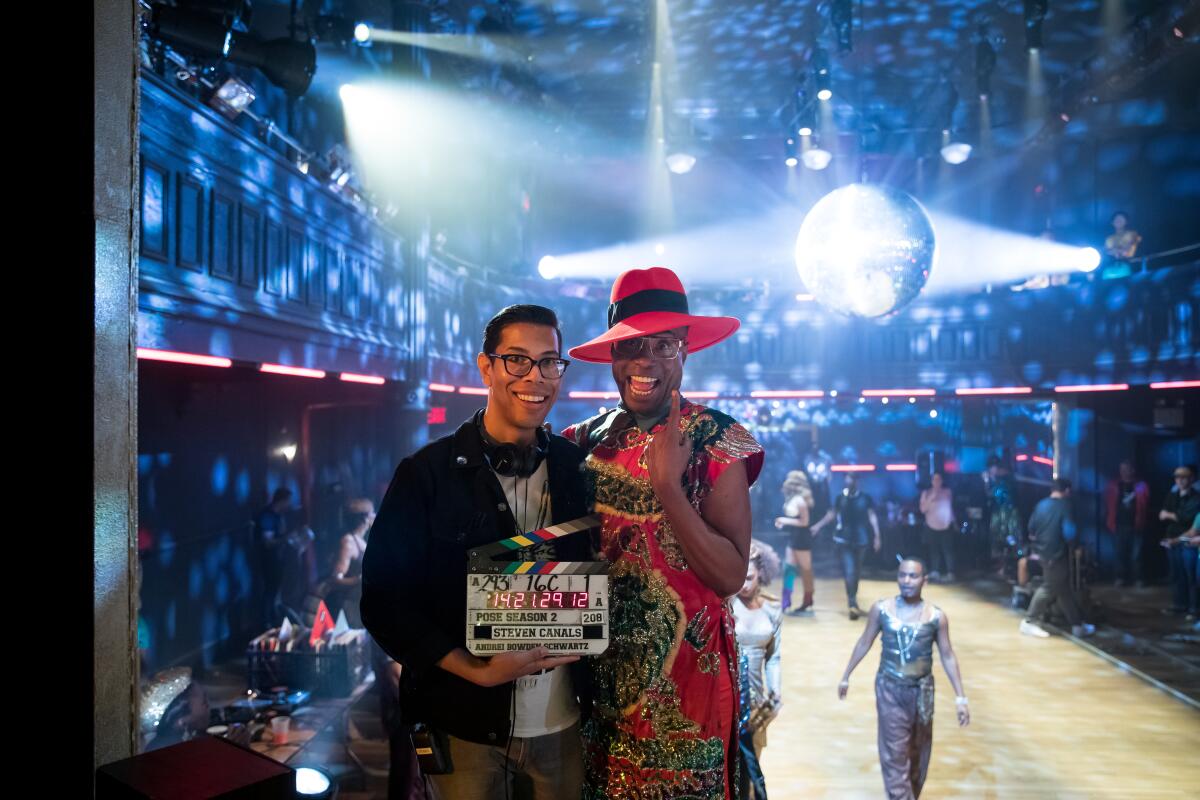
- Share via
BRONX, N.Y. — On a Tuesday morning in late June, a party was going on in the South Bronx.
In a desolate corner of the borough, lined with self-storage facilities and truck yards, hundreds of extras in sequins and glitter stood on a soundstage meticulously constructed to resemble a theater in downtown Manhattan.
“The next category is femme queen vooooogue,” said Billy Porter, bellowing into a microphone as the MC Pray Tell in a scene from an upcoming episode of “Pose.” As a disco ball four feet in diameter spun overhead and Rick James’ “Give It to Me” thumped on the sound system, a woman in a fringed white catsuit writhed hypnotically on the dance floor, eliciting whoops of approval from the sweaty masses. “Giving us that ‘Flashdance’ realness!” said Porter, onstage in a wide red hat and a red silk dragon-emblazoned ensemble.
It was ball day on the FX drama, which is set in New York’s ball scene in the late ‘80s and early ‘90s — an LGBTQ subculture in which primarily black and Latinx participants take part in glamorous competitions that play up the performative nature of gender.
Recently nominated for six Emmys, “Pose” not only boasts the largest transgender cast on television, but its creative team, led by co-creators Steven Canals, Ryan Murphy and Brad Falchuk, has also sought the involvement of the still-thriving house-ballroom community. Since the series, though joyful, often deals in grim subject matter — Season 1 focused on the AIDS crisis, while Season 2 has tackled the epidemic of violence against trans women — it bears a responsibility to the community it depicts.
“We are all sensitive to not replicating past hurts and pasts traumas,” Canals said. “The ballroom community is one that for decades has been appropriated, with very little acknowledgment of their contribution to pop culture. We are creating a show that is highlighting the courage, the resilience and the artistry of this community.”
This wisdom comes in especially handy on ball days, when everything from the lip gloss to the lingo has to feel celebratory, period-accurate and — perhaps most important — authentic to the milieu. This is how “Pose” throws a ball.
This post contains spoilers for Tuesday’s episode of “Pose,” “Never Knew Love Like This Before.”
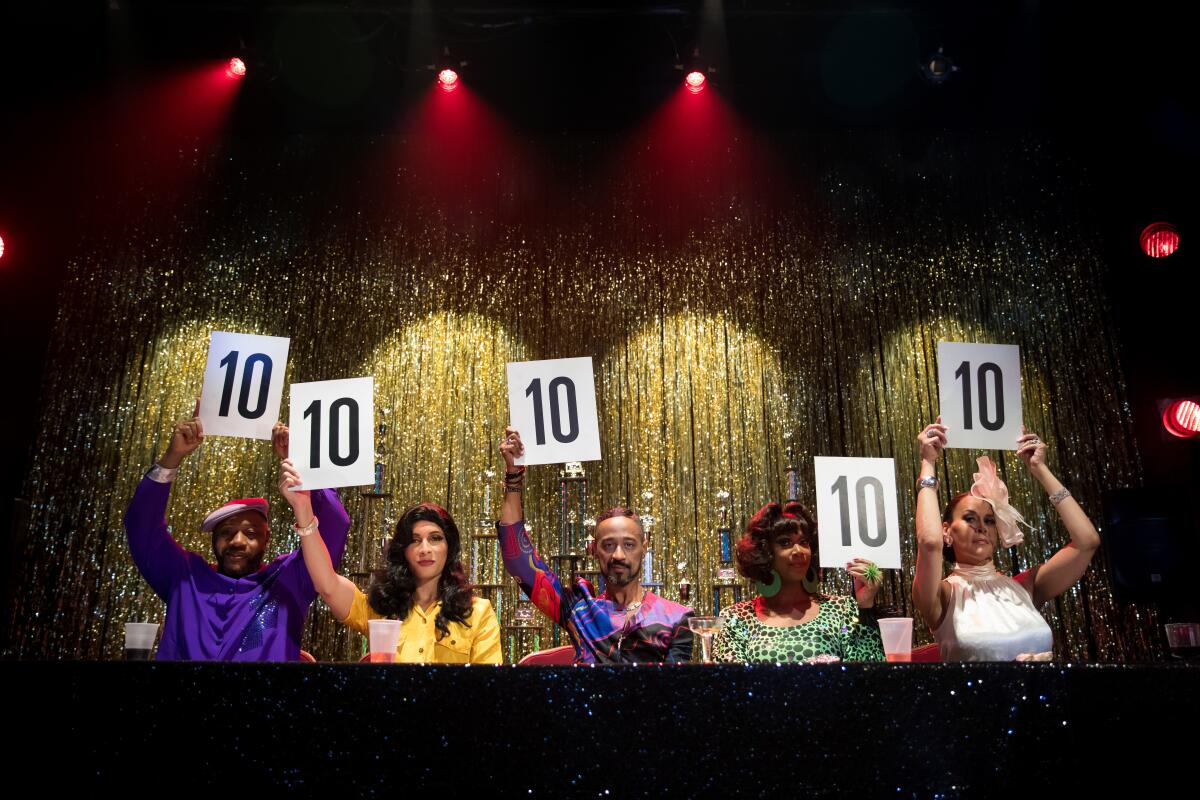
Categories
You can’t plan a ball without choosing the categories first. In this episode, “Revelations,” which airs Tuesday, they’re Body — sexiest physique — Butch Queen Vogue — for cisgender gay men — and Femme Queen Vogue — for transgender women.
The Femme Queen Vogue category has an additional hair element: Competitors, including Florida Ferocity (Leiomy Maldonado), whip their manes around wildly. The category is “all about the femininity, the flare, the extra, the selling of the curves, the selling of the hair,” said Maldonado, who is also the show’s vogue choreographer. Butch Queen Vogue, meanwhile, is about “the guys emulating the girls being feminine,” she explains.
“You can’t go to a ball today without seeing a Butch Queen Vogue or a Femme Queen performance. If you did. the girls would not come,” said Jack Mizrahi, a veteran of New York’s ball scene who is also a consultant and guest star on “Pose.”
When it comes to choosing the themes for each episode’s ball, there are two approaches, explained Canals, writer and director of “Revelations”: balls that provide a colorful reprieve from the drama and balls that are central to the narrative.
The ball in “Revelations” is an example of the latter. The episode finds tension building within the House of Evangelista, founded by “mother” Blanca (Mj Rodriguez). One of her “children,” Damon (Ryan Jamaal Swain), is in the middle of a fight when he’s pulled into the Butch Queen Vogue competition — adding to the tension while giving him an outlet for expressing his rage.
“He’s taking all of that energy from this argument, and putting it into what he’s doing on the ballroom floor,” Canals said.
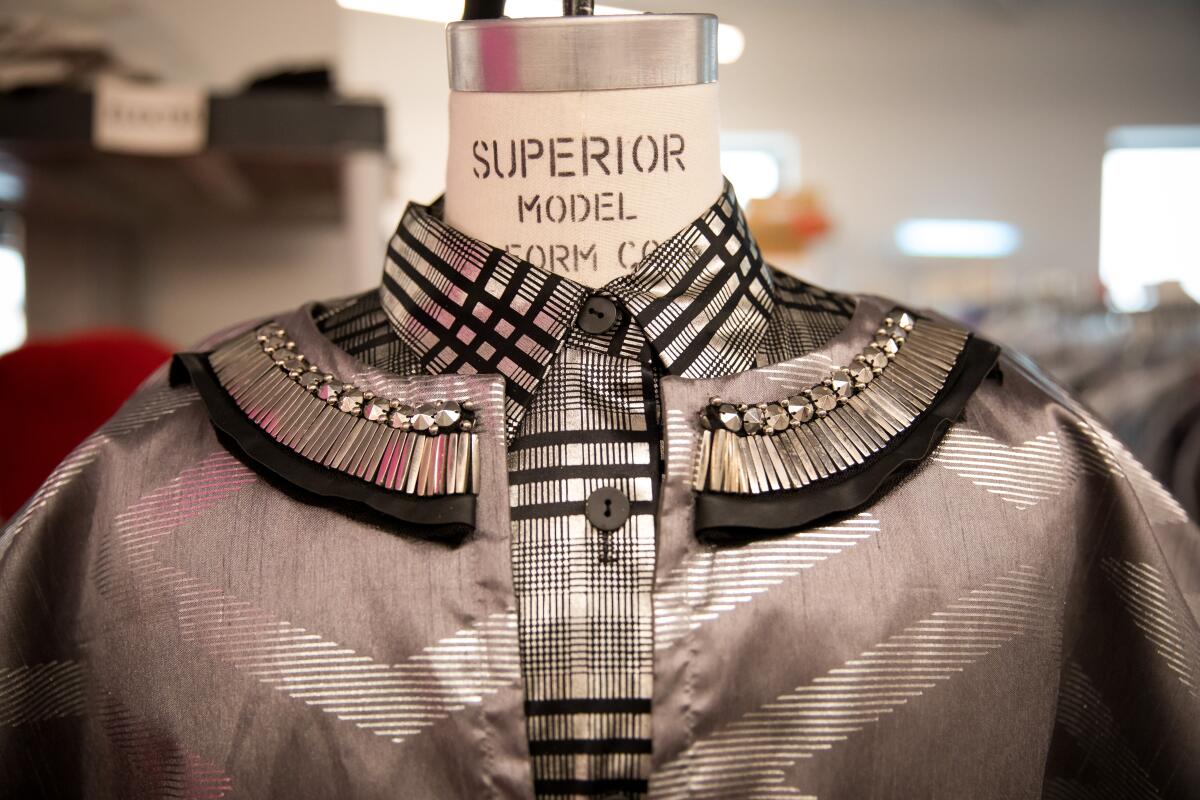
Costumes
Ideas for the look and feel of each ball begin at the concept meeting, where executive producers and department heads go page by page through the script, brainstorming ideas for the hair, makeup, costumes and other design elements.
In the world of “Pose,” it’s summer 1990, and Canals wanted “everything to feel light and breezy,” he said. “We want everyone to look dewy — not sweaty, dewy.”
At the meeting for “Revelations,” Canals also said he wanted a shot of Pray Tell wearing a wide-brimmed hat, inspired by the famous scene of Kate Winslet exiting a car in “Titanic.”
So costume designer Analucia McGorty repurposed a 1930s kimono, purchased at a thrift shop, into Pray Tell’s wide-legged, Asian-influenced suit, worn over a button-down and tie. The luxurious blend of masculine and feminine is typical of the character, one of the few on “Pose” who never repeats an outfit. “He’s an MC, he’s an elder and he’s a designer, so he’s got to play that up,” McGorty said, pointing to the long garment rack devoted to his looks.
As Florida, Maldonado wears a white catsuit — fringed to accentuate her dance moves — that looks like something Bob Mackie might have designed for Cher, paired with thigh-high neon green boots. Her rival, Silhouette (Brielle “Tati” Rheames), wears an athletic bodysuit with knee pads. McGorty duplicates the looks in order to avoid delay if anything splits or tears during their performance. “We don’t want to hold camera,” she said.
Several characters are in costumes inspired by pop music stars of the era. Damon is in a pair of purple harem pants, perfectly on trend when MC Hammer ruled the charts; in the body competition, Lil Papi (Angel Bismark Curiel), shirtless and covered in oil, wears jeans to match a pair worn by L.L. Cool J — “the sexy body of 1990,” McGorty said.
McGorty has background costumers who put together “bright, colorful New York looks circa 1990” for the dozens of extras in the ball scenes, pulling — and sometimes inventively repurposing — clothes from costume warehouses, vintage stores and thrift shops. A few extras even bring their own wardrobes. McGorty also discusses lighting with the camera and electrical departments “so we make sure the colors pop on the people they should be popping on.”
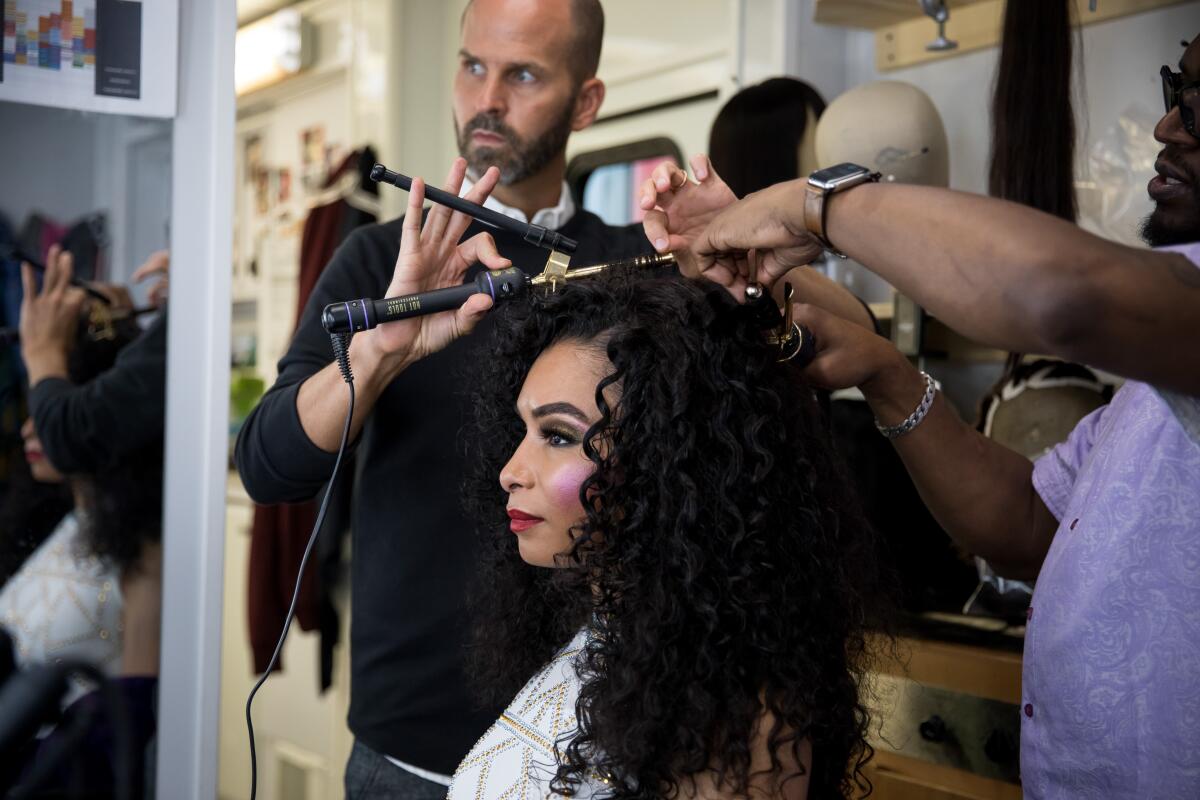
Hair and makeup
On ball day, the hair and makeup team begins work before dawn. They have a long to-do list: About 20 principal performers and 160 background players need to be put through the works — hair, nails, makeup — to be glammed-up and camera-ready by mid-morning.
“It’s lots of lashes, glitter, big lips, nails,” said makeup department head Sherri Berman Laurence, seated in the narrow makeup trailer, whose walls are covered in inspirational collages.
Luckily, the nudes, browns and dark reds popular in the late ‘80s and ‘90s are back in style. And while glitter may be timeless, tattoos and body piercings are not: They have to be covered up. So Lil Papi looks as cut as possible for the body competition, Curiel gets cosmetically enhancedabs in addition to the generous coating of oil.
For hair department head Barry Lee Moe, the time period presents a challenge because of the instant associations with “1980s hair,” he said. “Most people would jump to clichéd silhouettes: a side pony with a scrunchie and a claw bang.” His goal is to make everyone look beautiful, but also accurate to an era of unfortunate hair.
This morning, Moe has been busy styling Maldonado and Rheames for their hair-whipping Femme Queen Vogue performances. Their augmented manes need to be voluminous enough to make an impact, yet secure enough not to go flying off their heads.
Meanwhile, 14 stylists are coiffing the hordes of background players using about 50 wigs designated for extras. To authentically represent the ballgoers, many of whom have little money, the show uses a mix of high-end hairpieces and “shake-and-go street wigs,” Moe said. “It was important to me to make sure we aren’t using wigs that are all expensive. If you put some time into it, you can end up with these glamorous hairstyles. And some of them aren’t so glamorous, because they’re real.”
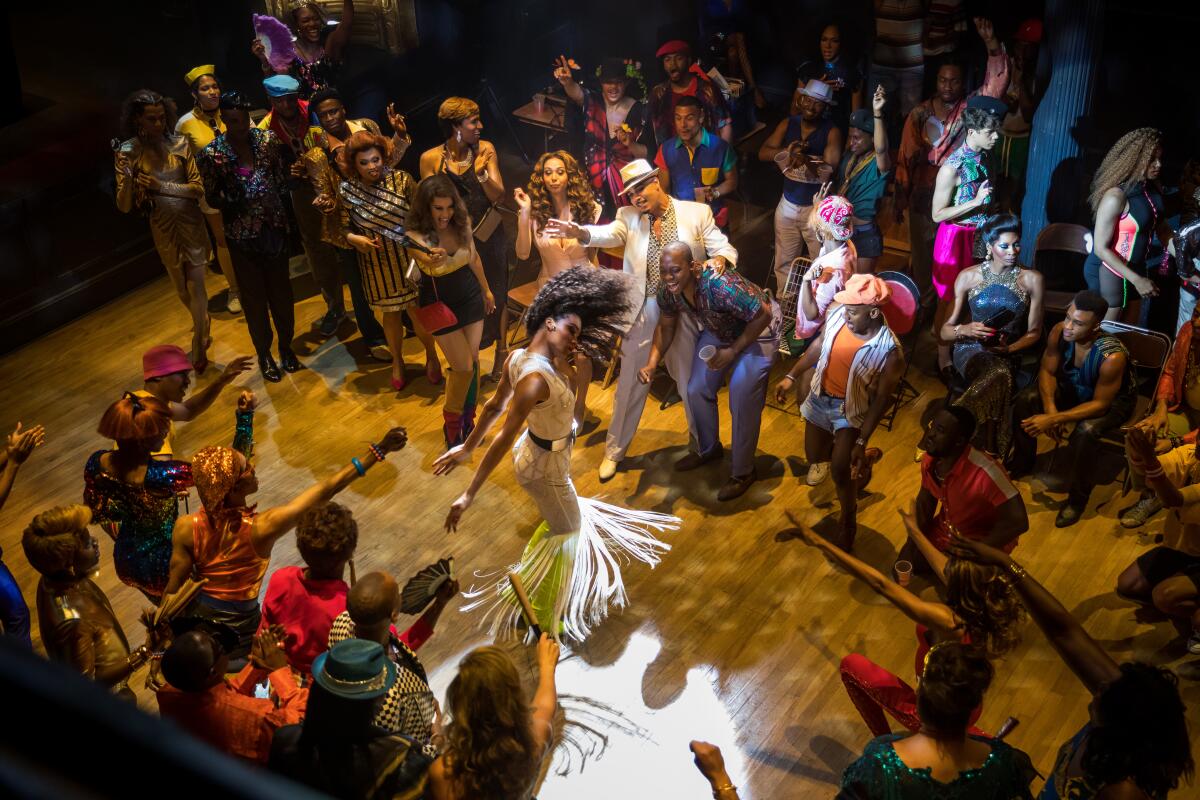
Music
When it comes to the “Pose” soundtrack, music supervisor and executive producer Alexis Martin Woodall strives for “a constant balance between major hits, lesser-known tracks and then some surprises.”
For the ball in “Revelations,” Martin Woodall chose three popular tracks: Digital Underground’s “The Humpty Dance” for Body, Rick James’ “Give It to Me Baby” for Femme Queen Vogue and Rob Base and DJ E-Z Rock’s “It Takes Two” for Butch Queen Vogue.
These songs “stood out for me in this episode because of tone and tempo,” she said. “The Humpty Dance” felt right because it’s “a song about a confident man and sex.” (“Also,” she added, “let’s be real, who doesn’t love the line, ‘I once got busy in a Burger King bathroom”?)
For Femme Queen Vogue, Martin Woodall liked disco and early ‘80s — “uptempo with attitude.” James’ song is “fun but pointed” and therefore fitting for the scene, which cuts between the competition and the House of Evangelista argument.
Finally, she chose 1988’s “It Takes Two,” a song that’s tough and masculine and underscores Damon’s mindset: “It needs to be as aggressive as possible,” she said.
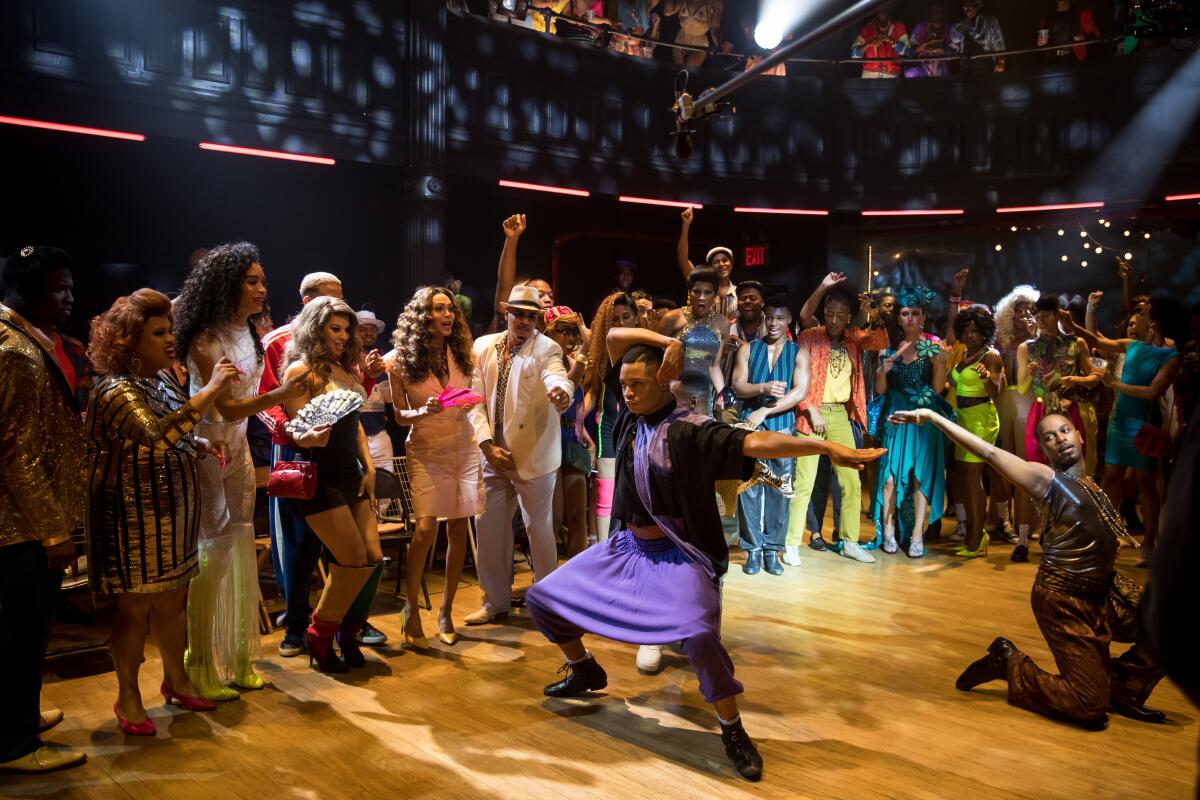
Choreography
“Revelations” takes place as Madonna’s No. 1 hit “Vogue” is pushing the ball culture into the mainstream. Maldonado is a pioneer in the so-called “New Way” of voguing: “I found a way to mix the femininity with the acrobatic,” she said, relaxing in the show’s funeral parlor set during a scene change, her feet tucked into a pair of Ugg boots. “That’s why they call me the Wonder Woman of Vogue.”
To prepare for the show, she had to immerse herself in the “Old Way” of voguing, which is “all about lines and boxes” — imitating the poses seen in fashion magazines. “I like to call it ‘watering down,’” she said. “As a performer, my level is really high. It’s not that it doesn’t take the same effort, it’s just different.”
Little about her performance seems “watered-down,” though. She spins and dips dramatically and bounces kinetically during the low, squatting move known as the “duck walk,” all while tossing her curly mane.
“The more hair the better,” she said.
During the Butch Queen Vogue competition performance, Damon riles up the crowd with a fierce floor performance — posing and thrusting his limbs while on the ground, at one point balancing his weight on a single shoulder. Swain is a trained dancer who received additional instruction in voguing from Maldonado and others. “We wanted to give Damon a moment where he can really shine,” said Maldonado. “He’s been working really hard.”
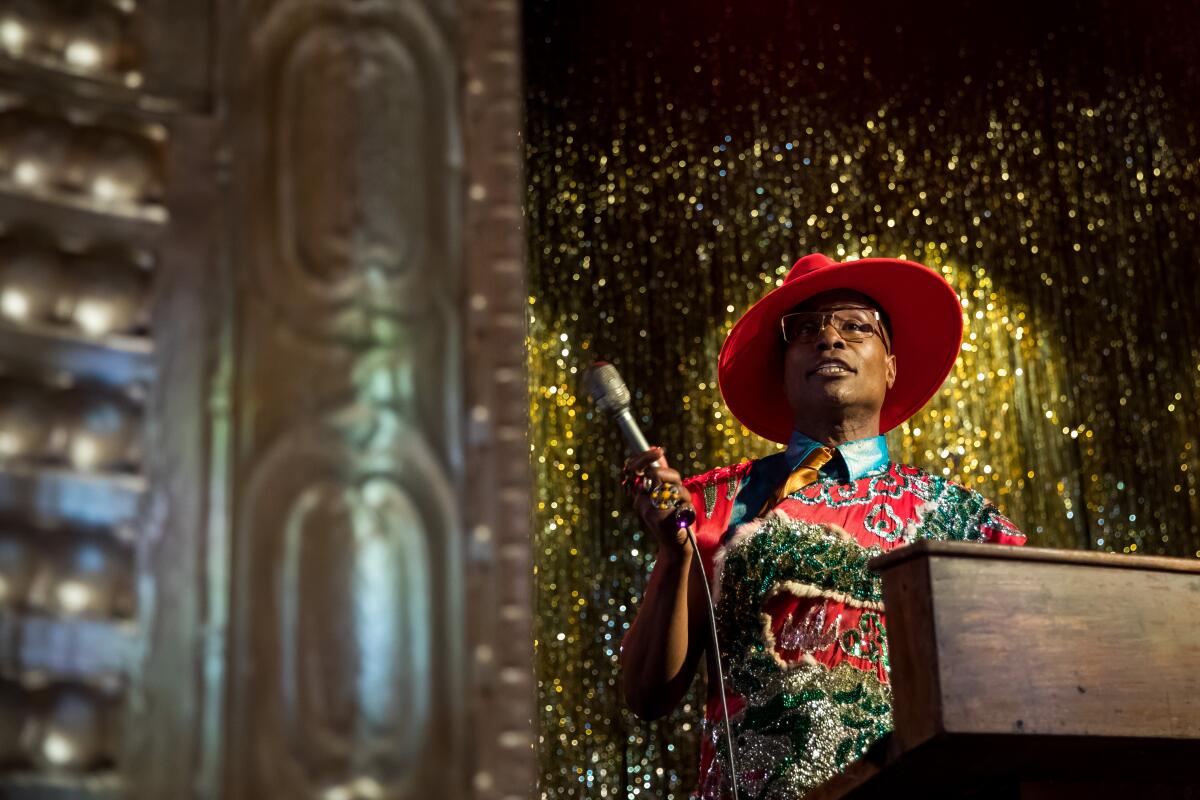
The master of ceremonies
It’s time for Billy Porter’s closeup.
The Tony-winning star of “Kinky Boots” is used to performing for a live audience. This comes in handy when he has to MC, narrating the proceedings with witty commentary — and the occasional catty put-down.
“Oooh, that face! That face is maaad!” Porter hissed into a microphone as a fired-up Swain took to the dance floor. “He’s like, ‘Get out my way! Get out my way, bitch!’”
After filming wide shots with music, Canals has moved in for a tight shot on Porter’s face. In order to capture his dialogue, the setup is filmed without music. The crowd dances and gesticulates in silence.
The actor likes working in this order, which gives him time to “luxuriate and feel it out and really solidify” the best line readings, said Porter, who liberally ad-libs and tweaks his dialogue. .
Canals said he gave him one note: “Say whatever you need to say. We just need to make sure the intention of the scene is there.”
“The scripts that come in are extraordinary,” said Porter, whose riffs are inspired by the costumes and performances. “What’s already on the page creates a template for me to springboard and develop into something that feels organic. It’s already organic on the page, because the people who wrote it are from the world, so nobody’s trying to create something that they don’t understand.”
Consultants, including Mizrahi and Jose Gutierez Xtravaganza also weigh in when necessary, making sure the language and terminology is accurate.
“I’ll come in and say, ‘Maybe that name won’t work,’” said Mizrahi, “but the ‘Pose’ team has it pretty down pat.”
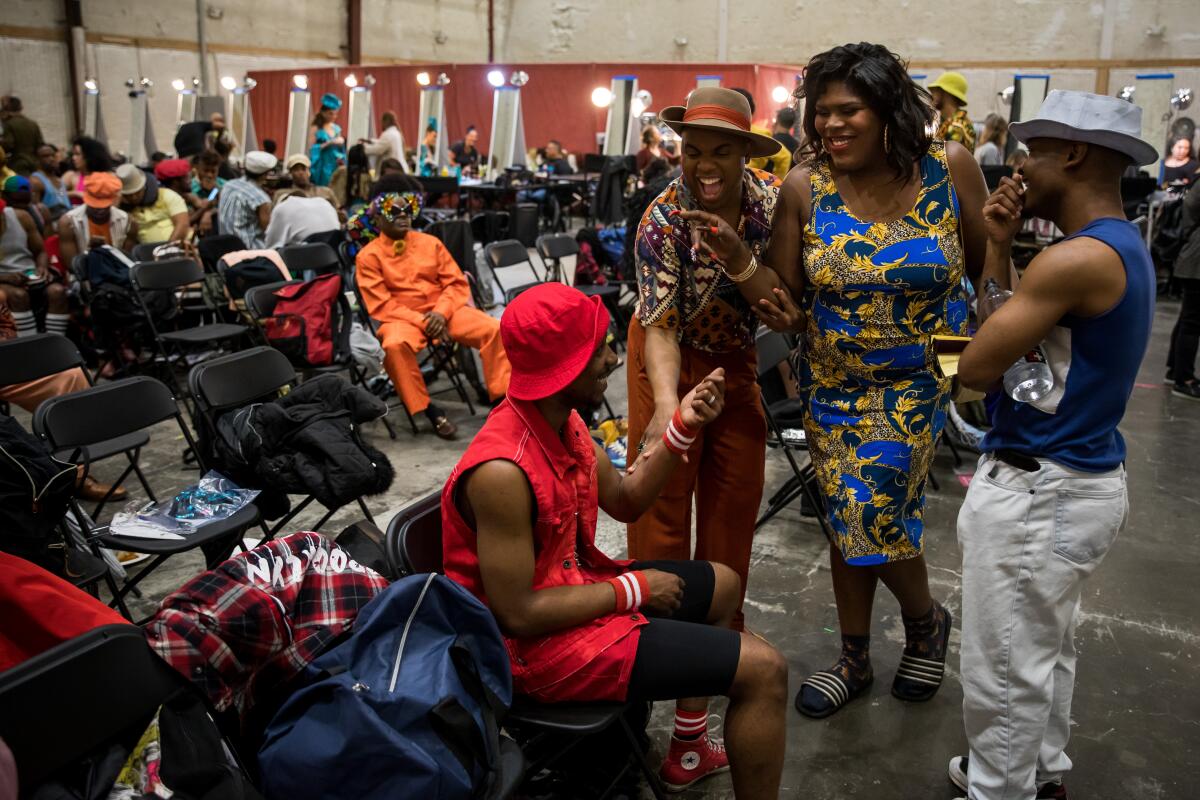
The crowd
No ball would be complete with a boisterous crowd. About 75% of the background players in the series’ ball scenes come from the ballroom community, estimates Twiggy Pucci Garçon. A veteran of the scene, she is officially the show’s runway choreographer, but also spreads the word about background auditions, often via social media.
Particularly when it comes to featured background performers — characters who are seen on camera competing in the balls — efforts are made to cast people who have actually walked in a given category and have attained a particular status within the community. (The terms “icon,” “legend,” “star” and “statement” indicate specific ranks.) Some background players have gone on to work in other shows, including “Fosse/Verdon” and “Tales of the City.”
The ball in “Revelations” takes place at the height of “Vogue”-mania, so it’s especially packed thanks to the interloping “tourists” who’ve come to check out the scene.
On many sets, the holding area for extras can feel like a tedious purgatory, but on ball day at “Pose,” the atmosphere is vibrant. A background performer in a hat draped with ivy sways to disco music while another in gold chain flaps preens in his fringed jacket. Between takes, they carefully deposit their (fake) drinks — Sunkist and Fanta rather than alcoholic punch — and prop cigarettes on a folding table marked with a numbered grid, to ensure continuity.
The ball may be carefully staged, but the excitement is real, Garçon said.
“There’s a special thing that happens on ball days.”
More to Read
The complete guide to home viewing
Get Screen Gab for everything about the TV shows and streaming movies everyone’s talking about.
You may occasionally receive promotional content from the Los Angeles Times.






